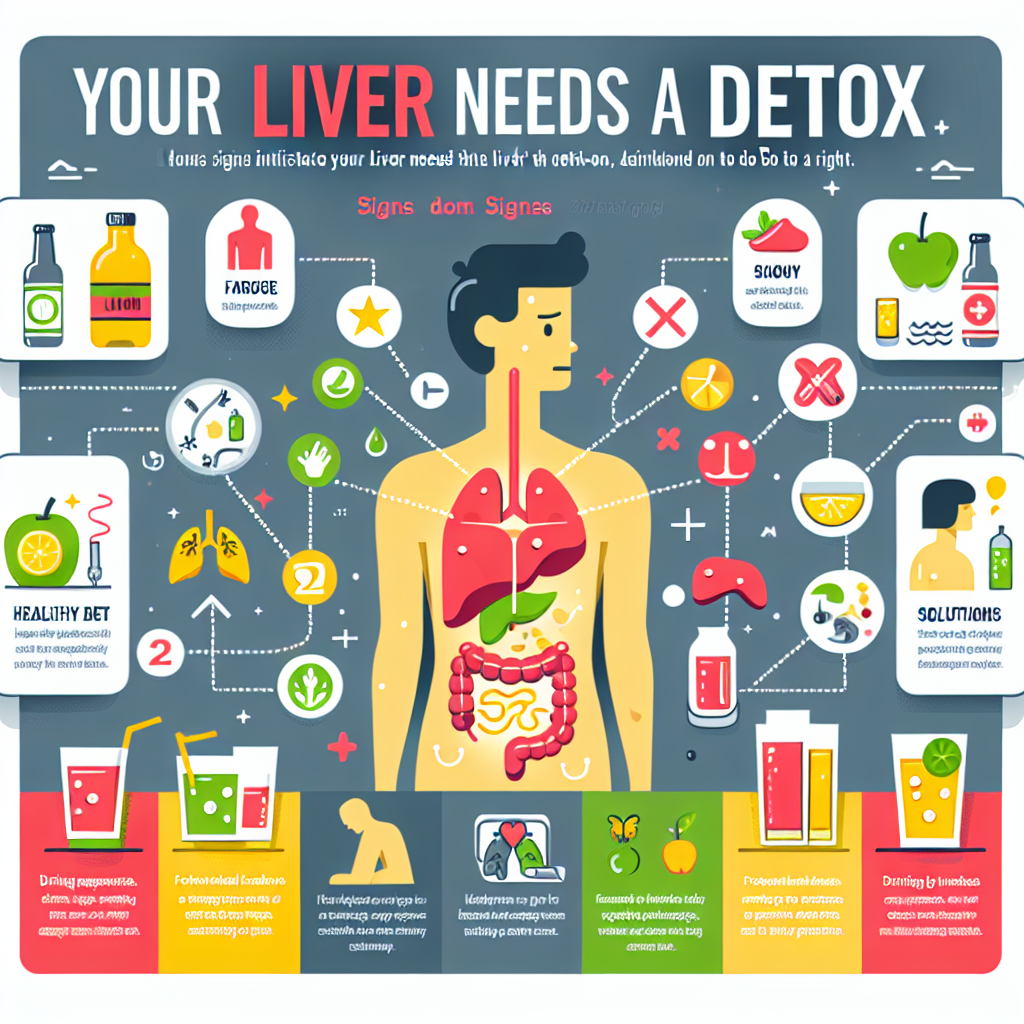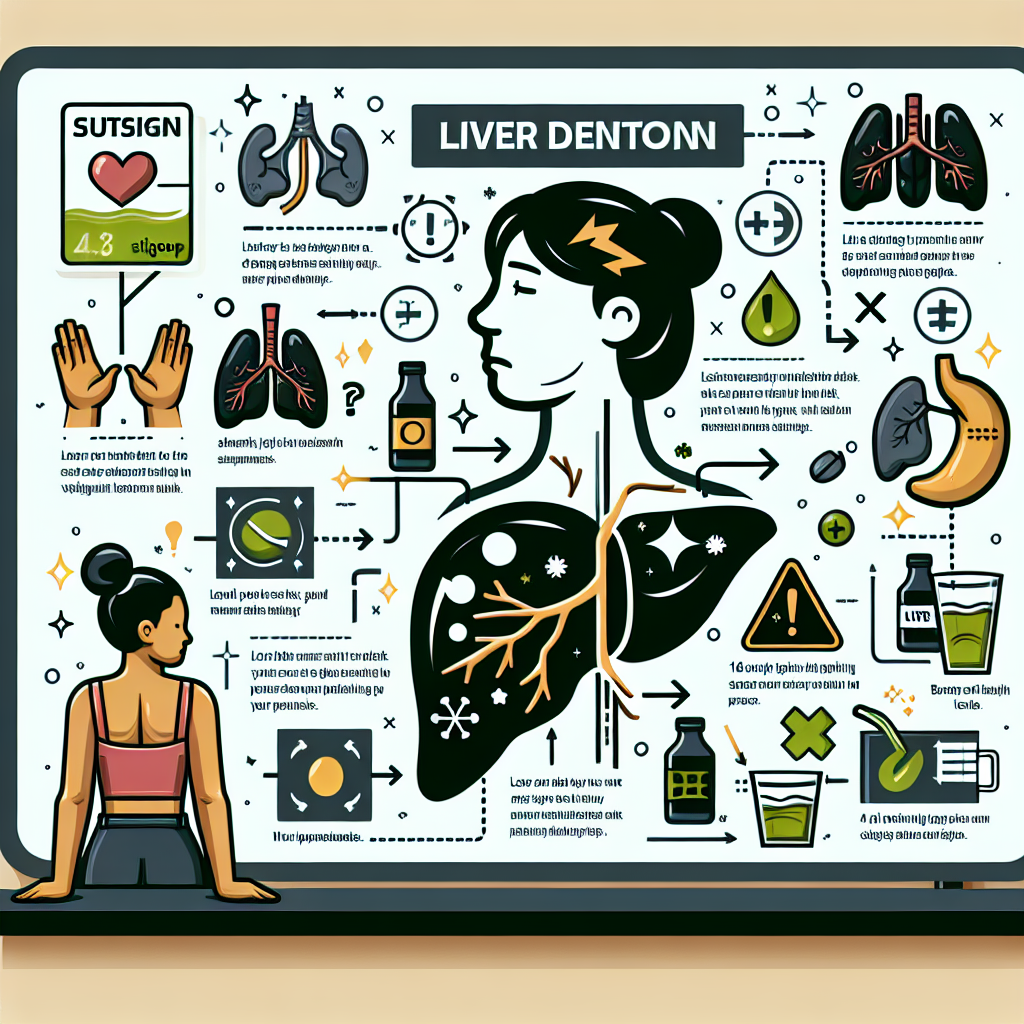Signs Your Liver Needs a Detox (And How to Do It Right)

“Are you experiencing fatigue, skin discoloration, or digestive issues? These could be signs that your liver needs a detox. Learn how to detox your liver the right way and regain your health. Visit My Vibrant Vitality now to get started.”
Recognizing the Warning Signs: When Your Liver Needs a Detox
The liver, one of the most vital organs in the human body, plays a crucial role in maintaining overall health. It is responsible for detoxifying the blood, producing bile for digestion, storing essential vitamins and minerals, and regulating hormones. However, due to unhealthy lifestyle choices, environmental pollutants, and excessive alcohol consumption, the liver can become overburdened and unable to function optimally. This is where the concept of a liver detox comes into play. But how do you know when your liver needs a detox? Recognizing the warning signs is the first step towards restoring your liver’s health.
One of the most common signs that your liver may need a detox is chronic fatigue. The liver plays a significant role in energy production. When it is overworked or stressed, it can’t produce energy as efficiently, leading to persistent tiredness. This is not the kind of fatigue that goes away after a good night’s sleep; it’s a deep, bone-weary exhaustion that doesn’t improve with rest.
Another sign is unexplained weight gain. When the liver is not functioning optimally, it struggles to break down and remove toxins from the body. These toxins can then be stored in fat cells, leading to weight gain that is difficult to lose, despite regular exercise and a healthy diet.
Skin problems such as acne, rashes, or a yellowish tint to the skin and eyes (a condition known as jaundice) can also indicate that your liver needs a detox. The liver helps to remove toxins from the body, and when it is unable to do so effectively, these toxins can manifest in the skin.
Digestive issues like bloating, gas, constipation, or diarrhea can also be signs of a struggling liver. The liver produces bile, which is essential for the digestion of fats. If the liver is not producing enough bile, or if the bile is not flowing freely, it can lead to digestive problems.
If you’re experiencing any of these symptoms, it may be time to consider a liver detox. But how do you do it right? The first step is to reduce the load on your liver. This means cutting out alcohol, reducing your intake of processed foods, and avoiding exposure to environmental toxins as much as possible.
Next, focus on eating a liver-friendly diet. This includes foods that are high in antioxidants, such as fruits and vegetables, as well as foods that support liver health, like garlic, beets, and leafy greens. Drinking plenty of water is also essential, as it helps to flush toxins out of the body.
Exercise is another crucial component of a successful liver detox. Regular physical activity helps to boost circulation, which in turn aids the liver in removing toxins from the body.
Finally, consider taking supplements that support liver health. Milk thistle, for example, has been shown to protect the liver from damage and improve its function. However, always consult with a healthcare professional before starting any new supplement regimen.
In conclusion, recognizing the warning signs that your liver may need a detox is crucial for maintaining optimal health. By reducing your exposure to toxins, eating a liver-friendly diet, staying hydrated, exercising regularly, and considering liver-supporting supplements, you can help your liver to function at its best. Remember, your liver works hard to keep you healthy; it’s only fair that you do your part to keep it healthy too.
Understanding Liver Health: How to Identify the Need for a Detox

The liver, one of the most vital organs in the human body, plays a crucial role in maintaining overall health. It is responsible for detoxifying the body, metabolizing nutrients, and producing proteins necessary for blood clotting. However, due to various factors such as poor diet, excessive alcohol consumption, and exposure to environmental toxins, the liver can become overburdened and its functionality can be compromised. This is where the concept of a liver detox comes into play. But how can you tell if your liver needs a detox? And more importantly, how can you do it right?
Firstly, it’s important to understand the signs that your liver may be in need of a detox. These signs can be subtle and often go unnoticed until they become more severe. One of the most common symptoms is chronic fatigue. The liver plays a key role in energy production, so when it’s not functioning optimally, you may feel constantly tired, regardless of how much sleep you get.
Another sign is unexplained weight gain. When the liver is not able to properly metabolize and break down fats, these fats can accumulate in the body, leading to weight gain. Additionally, skin and eye discoloration, bad breath, excessive sweating, and abdominal bloating can also indicate that your liver is struggling and may need a detox.
Once you’ve identified the need for a liver detox, the next step is to understand how to do it right. It’s important to note that a liver detox is not about quick fixes or drastic measures. Rather, it’s about making long-term lifestyle changes that support liver health.
One of the most effective ways to detox your liver is to improve your diet. Consuming a diet rich in fruits, vegetables, lean proteins, and whole grains can help to support liver function. Foods that are particularly beneficial for the liver include those high in antioxidants, such as berries, and those that aid in detoxification, such as cruciferous vegetables like broccoli and cauliflower.
Reducing alcohol consumption is another crucial step in detoxing your liver. Alcohol can damage liver cells and lead to inflammation and scarring. If you choose to drink, do so in moderation and consider having several alcohol-free days each week.
Regular exercise is also beneficial for liver health. It helps to burn triglycerides for fuel and can also reduce liver fat. Aim for at least 30 minutes of moderate-intensity exercise most days of the week.
Lastly, staying hydrated is essential for a liver detox. Water aids in digestion, keeps the body hydrated, and helps the liver to flush out toxins. Aim to drink at least eight glasses of water per day.
In conclusion, understanding the signs that your liver may need a detox and knowing how to do it right is crucial for maintaining optimal liver health. Remember, a liver detox is not about quick fixes, but rather about making sustainable lifestyle changes. If you’re experiencing any of the symptoms mentioned above, it may be time to give your liver a much-needed detox. However, always consult with a healthcare professional before starting any new health regimen.
The Ultimate Guide to Liver Detox: Signs You Need It and How to Do It Right
The liver, one of the most vital organs in the human body, plays a crucial role in maintaining overall health. It is responsible for detoxifying harmful substances, metabolizing drugs, and producing proteins necessary for blood clotting. However, due to various factors such as poor diet, excessive alcohol consumption, and exposure to environmental toxins, the liver can become overburdened and its functionality can be compromised. This is where the concept of a liver detox comes into play. But how do you know if your liver needs a detox? And more importantly, how do you do it right?
The first step is to recognize the signs that your liver may be in need of a detox. These signs can manifest in various ways, including chronic fatigue, unexplained weight gain, high cholesterol, excessive sweating, poor digestion, and skin problems such as acne or a yellowish tint to the skin and eyes. Additionally, you may experience mood swings, anxiety, or depression, as the liver is closely linked to hormonal balance. If you notice any of these symptoms, it may be an indication that your liver is struggling to eliminate toxins from your body and could benefit from a detox.
Once you’ve identified the need for a liver detox, the next step is to understand how to do it right. It’s important to note that a liver detox is not about fasting or following a restrictive diet. Instead, it’s about nourishing your body with the right nutrients to support liver function and promote the elimination of toxins.
Start by improving your diet. Incorporate foods that are known to support liver health, such as cruciferous vegetables, berries, nuts, and seeds, and lean proteins. These foods are rich in antioxidants and essential nutrients that help to protect the liver and enhance its detoxification processes. At the same time, try to limit your intake of processed foods, alcohol, and caffeine, as these can put additional strain on your liver.
Hydration is another key aspect of a successful liver detox. Drinking plenty of water helps to flush toxins out of your body and supports the overall health of your liver. Aim to drink at least 8 glasses of water per day, and consider adding lemon to your water for an extra detoxifying boost.
Exercise is also beneficial for liver health. Regular physical activity helps to stimulate the circulatory system, which in turn aids in the detoxification process. Aim for at least 30 minutes of moderate-intensity exercise most days of the week.
Lastly, consider taking supplements that support liver health. Milk thistle, for example, is a herb known for its liver-protecting properties. Other beneficial supplements include turmeric, dandelion root, and artichoke extract. However, always consult with a healthcare professional before starting any new supplement regimen.
In conclusion, recognizing the signs that your liver may need a detox is the first step towards improving your liver health. By incorporating a healthy diet, staying hydrated, exercising regularly, and considering the use of supplements, you can support your liver in its vital role of detoxification. Remember, a healthy liver is essential for overall well-being, so it’s worth taking the time to care for it properly.